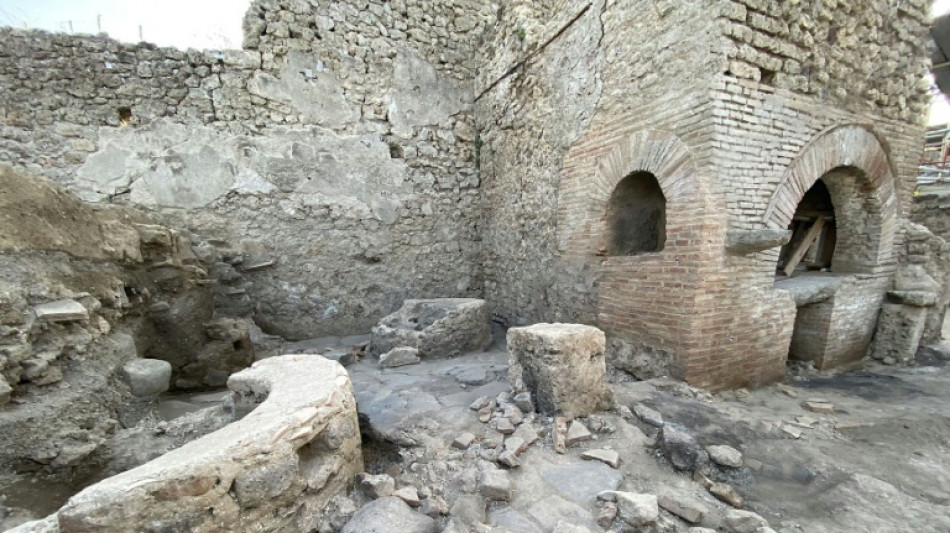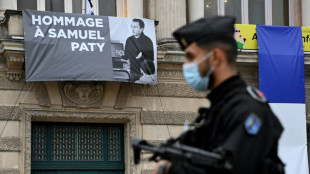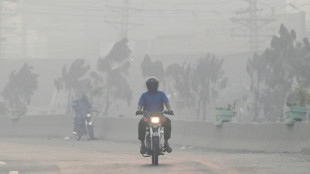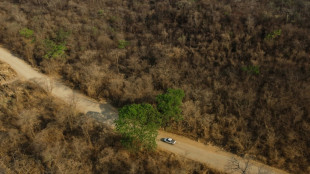
-
 US writes off over $1 billion of Somalia debt
US writes off over $1 billion of Somalia debt
-
Stock markets climb, dollar dips as US votes

-
 Boeing union approves contract, ending over 7-week strike
Boeing union approves contract, ending over 7-week strike
-
Stock markets rise, dollar falls as US votes

-
 US September trade deficit widest in over two years
US September trade deficit widest in over two years
-
'Black day': French workers protest Michelin plans to close two plants

-
 Saudi Aramco's quarterly profit drops 15% on low oil prices
Saudi Aramco's quarterly profit drops 15% on low oil prices
-
Spain unveils aid plan a week after catastrophic floods

-
 Europe auto struggles lead to cuts at Michelin, Germany's Schaeffler
Europe auto struggles lead to cuts at Michelin, Germany's Schaeffler
-
Norway speeds ahead of EU in race for fossil-free roads

-
 Most Asian markets rise as US heads to polls in toss-up vote
Most Asian markets rise as US heads to polls in toss-up vote
-
Nintendo lowers sales forecast as first-half profits plunge

-
 Most Asian markets rise ahead of toss-up US election
Most Asian markets rise ahead of toss-up US election
-
Saudi Aramco says quarterly profit drops 15% on low oil prices

-
 Boeing union says approves contract, ending over 7-week strike
Boeing union says approves contract, ending over 7-week strike
-
New Hampshire hamlet tied in first US Election day votes

-
 China's premier 'fully confident' of hitting growth targets
China's premier 'fully confident' of hitting growth targets
-
Asian markets swing ahead of toss-up US election

-
 Turkey sacks 3 mayors on 'terror' charges, sparking fury in southeast
Turkey sacks 3 mayors on 'terror' charges, sparking fury in southeast
-
Prince William plays rugby on S.Africa climate prize visit

-
 Striking workers weigh latest Boeing contract offer
Striking workers weigh latest Boeing contract offer
-
Montreux Jazz Festival hails 'godfather' Quincy Jones

-
 Stock markets hesitant before knife-edge US election
Stock markets hesitant before knife-edge US election
-
'War ruined me': Lebanon's farmers mourn lost season

-
 Stock markets rise before knife-edge US election
Stock markets rise before knife-edge US election
-
Eight on trial over French teacher's 2020 beheading

-
 Ryanair profit falls, growth hit by Boeing delays
Ryanair profit falls, growth hit by Boeing delays
-
Quincy Jones, entertainment titan and music mastermind

-
 Most markets rise ahead of US vote, China stimulus meeting
Most markets rise ahead of US vote, China stimulus meeting
-
Most Asian markets rise ahead of US vote, China stimulus meeting

-
 Climate finance billions at stake at COP29
Climate finance billions at stake at COP29
-
Nations gather for crunch climate talks in shadow of US vote

-
 Asian markets rise ahead of US election, Chinese stimulus meeting
Asian markets rise ahead of US election, Chinese stimulus meeting
-
No need to tell your husband: Harris banks on women's votes

-
 Striking Boeing workers set to vote on latest offer
Striking Boeing workers set to vote on latest offer
-
Pakistan shuts primary schools in Lahore over record pollution

-
 Fading literature: Delhi's famed Urdu Bazaar on last legs
Fading literature: Delhi's famed Urdu Bazaar on last legs
-
Green shoots spring from ashes in Brazil's fire-resistant savanna

-
 Serbia to demolish 'German' bridge amid outcry
Serbia to demolish 'German' bridge amid outcry
-
War decimates harvest in famine-threatened Sudan

-
 Nuts! NY authorities euthanize Instagram squirrel star
Nuts! NY authorities euthanize Instagram squirrel star
-
Nvidia to join Dow Jones Industrial Average, replacing Intel

-
 US stocks rebound on Amazon results ahead of Fed, election finale
US stocks rebound on Amazon results ahead of Fed, election finale
-
Wall Street bounces while oil prices climb on Middle East worries

-
 For a blind runner, the New York marathon is about 'vibrations'
For a blind runner, the New York marathon is about 'vibrations'
-
Wall Street bounces while oil prices gain on geopolitical fears

-
 ExxonMobil profits dip as it gives back almost $10 bn to investors
ExxonMobil profits dip as it gives back almost $10 bn to investors
-
Global stocks diverge, oil prices gain on geopolitical fears

-
 On Belgian coast, fishing on horseback -- and saving a tradition
On Belgian coast, fishing on horseback -- and saving a tradition
-
French brushmakers stage 'comeback' with pivot to luxury market


Archaeologists discover 'prison bakery' in ancient Pompeii
Archaeologists excavating the ancient Roman city of Pompeii have uncovered a "prison bakery" where slaves and blindfolded donkeys were kept locked up underground to grind grain for bread, officials said this week.
Underneath a house in the ruins they found "a cramped room with no view of the outside world and with small windows high in the wall, with iron bars, to let the light in", the Archaeological Park of Pompeii announced on Friday.
Archaeologists deduced they had found a "prison bakery", the UNESCO World Heritage Site near Naples, southern Italy, said on its website.
They also discovered "indentations" in the floor "to coordinate the movement of the animals, forced to walk around for hours, blindfolded".
The house, on the 44-hectare site that is currently under excavation, was divided into a residential area "decorated with exquisite Fourth Style frescoes" and a "productive quarter", the bakery.
Three skeletons were discovered in one room of the bakery, showing that the house was inhabited.
The bakery, where slaves and animals were forced to perform the backbreaking task of turning the millstones, had no doors or communication with the outside world.
- 'Shocking' side of ancient world -
"It is, in other words, a space in which we have to imagine the presence of people of servile status whose freedom of movement the owner felt the need to restrict," wrote Pompeii director Gabriel Zuchtreigel in a scholarly article.
"It is the most shocking side of ancient slavery, the one devoid of both trusting relationships and promises of manumission, where we were reduced to brute violence, an impression that is entirely confirmed by the securing of the few windows with iron bars."
The public can view more evidence of this harsh daily life in an exhibition called "The Other Pompeii: Ordinary Lives in the Shadow of Vesuvius" which opens at the Palestra Grande in Pompeii on December 15.
"(The exhibition is) dedicated to that myriad of individuals often forgotten by the historical sources, such as the slaves, who constituted the majority of the population and whose labour contributed in an important way not only to the economy, but also to the culture and social fabric of Roman civilization," the Pompeii authorities said.
Pompeii was devastated when nearby Mount Vesuvius erupted almost 2,000 years ago in 79 AD.
The ash and rock helped preserve many buildings almost in their original state, as well as forming eery shapes around the curled-up corpses of victims of the disaster, thought to number around 3,000.
Pompeii is the second most visited tourist destination in Italy after the Colosseum in Rome.
H.Meyer--CPN


